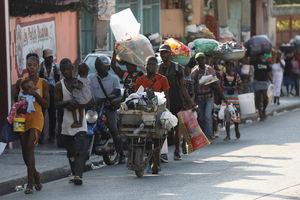When farmwork is the lifeline for widows

Widows Mary Emmanuel, Francisca Ferdinand and Bertha Julius.
What you need to know:
- They face many challenges trying to provide for their families.
- Some are dispossessed of their husbands' land and have no recourse.
On a warm Monday in 2013, Francisca Ferdinand bid her husband goodbye. He was on his way to their two-acre banana plantation in Tsuduni, a village in the Kilimanjaro region, Tanzania.
The ancestral farm was about 10 minutes away from the matrimonial home in the same village. Her husband was on a mission to establish whether the bananas were ready for harvesting and selling.
In the midst of his inspection, goons descended on him with pangas and killed him.

Francisca Ferdinand. Her husband died in 2013. He was killed by goons on his way to their two-acre banana plantation in Tsuduni, a village in the Kilimanjaro region, Tanzania.
“I reported the matter to the police, but they threatened to kill me. For the sake of my four children, I shelved the idea of seeking justice,” she says.
Her husband was a businessman selling farm produce and equipment in Tanzania and Kenya. Francisca says he pampered her. With him, she never worried about school fees for their children, all of whom were in high school.
His departure meant she had to take over the wheels. Although he left her with no savings, Francisca had access to their farm. She intercropped maize and beans with the focus of raising enough money to sustaining her family.
Harvests
The parcel yielded 28 sacks of maize and three for beans. She would sell one sack of maize at Tsh60,000 (Ksh3,493) and beans Tsh90,000 (Ksh5,239).
“Then I joined 10 savings groups; in some I contributed Tsh2,000 (Ksh117) or Tsh1,700 (Ksh99) weekly. In others, I saved Tsh12,000 (Ksh699) or Tsh11,000 (Ksh640) every month. With the savings, I secured multiple education loans,” she shares.
All her children are now through secondary but she is unable to see them through higher education. Three years ago, her in-laws dispossessed her of the land. “Now, I’m not in any group. I can’t afford to take and repay a loan.”
The in-laws allowed her to keep a small portion of land her husband inherited from her father-in-law. She says it's so small it can only accommodate vegetable plants for home consumption.
With no land to practise commercial farming, Francisca resorted to casual farmwork, earning a daily wage of Tsh5,000(Ksh291) to Tsh7,000 (Ksh407). “During the rainy season, I’m engaged three to four days a week, unlike when it's dry,” she says.
The situation is not much different for Bertha Julius, a fellow villager. When her husband, who had retired from teaching, died in 2013, she had neither a job nor a business of her own.

Bertha Julius. When her husband, who had retired from teaching, died in 2013, she had neither a job nor a business of her own.
But she had five children to raise; the eldest had just finished university and the younger ones were in secondary school.
Transport business
“I didn’t know where to start from. My husband ran a transport business with one truck he had bought. He met all our needs. I had nothing to worry about: he made sure we had enough food and were well clothed,” she says.
“Our land is less than an acre. I can’t grow enough bananas or maize for sell. We spend the little I harvest.”
She took over the business and put a distant relative in charge. One year later, the vehicle broke down and has remained grounded, as she can’t pay repair expenses.
She also turned to farm labour, drawing the same amount as Francisca. She saves Tsh12,000 (Ksh699) in a group every month, from where she receives loans to educate the rest of the children.
Her firstborn, who graduated with a degree in civil engineering, got a job in Dar es Salaam. He chips in whenever she is low in cash, she says.
“How I wish the Tanzanian government provided special grants to widows to start a business. I’d like to start a pig business,” she says.
Mary Emmanuel lost her husband in 2001. He left behind four children. At the time, he was a shoe businessman in Arusha. From his earnings, he provided for the family, with Mary supporting him to take care of the food expenses.

Mary Emmanuel. She lost her husband in 2001. She has to take care of their four children on her own.
Back at home in Tsuduni, she reared three dairy cows, selling their milk and looking after their one-acre coffee farm.
“His death brought darkness into my life. I was deeply worried about the future of my children. Days later, the reality hit me that my children have only me to depend on, so I had to brave out,” she says.
Amid her strive to cope with the grief, a strange disease struck her cows and they all died.
“I would not depend on coffee since harvesting is seasonal. I had to start working in people’s farms for a pay of Tsh5,000 (Ksh291). I was unable to educate my children. They didn’t go beyond Class Seven,” she says.





